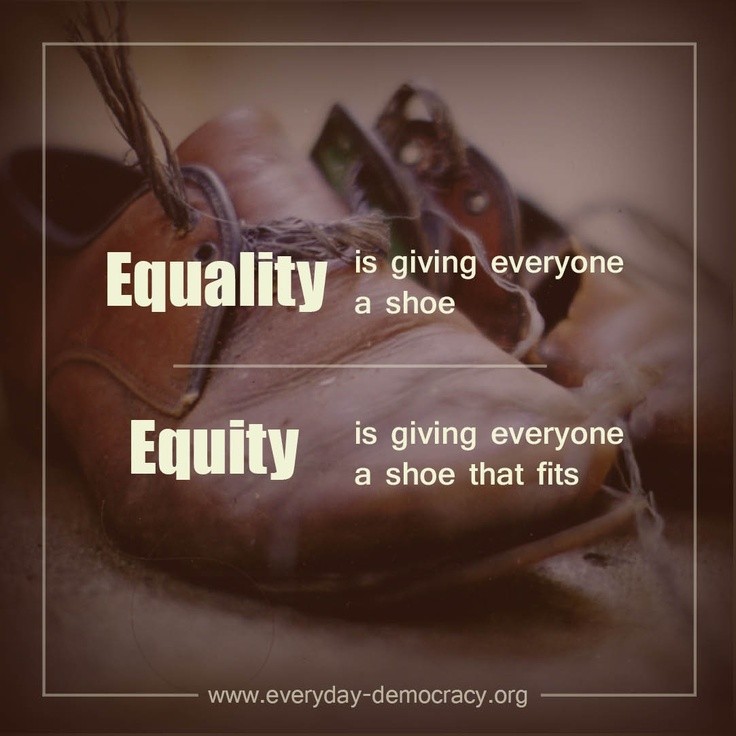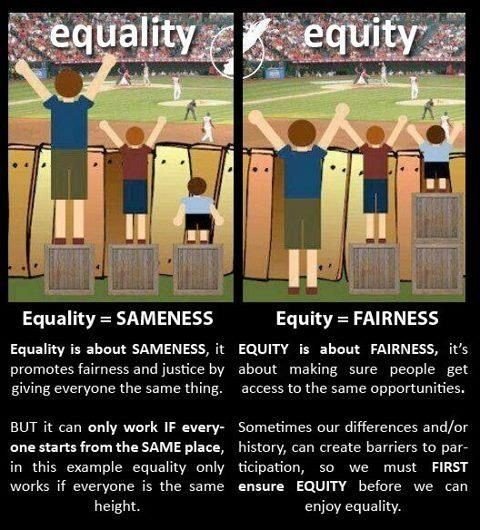Ensuring Global Equity for Sustainable development
Equity is generally viewed, in the context of nation states or of groups of individuals, in terms of differing welfare standards. At the nation states level, equity could also mean equitable sharing of natural resources such as water, land and air. This would imply that nations are able to alleviate any global resource shortage by a redistribution of that resource without endangering the physical capacity of the environment.
 image source
image source
Equity is, in more real terms, linked to issues such as human-related security and freedom, food security, energy security and health for all. This definition relates to current circumstance as well as to opportunities for future generations.
Food security will be directly affected by climate change. Achieving food security is also a function of the capacity of those who till the land, their knowledge and technologies used.
Energy security entails the continued availability of safe, clean and efficient sources of energy. It is no secret that our dependence on fossil fuels is the major cause of greenhouse gas emissions into our atmosphere. The current popular idea is to shift to renewable sources and/or use technologies that can reduce the global demand for fossil fuels.
In both the North and South, there has been an obvious lack of any concerted and strong leadership in any form of sustainable energy development: renewable energy technologies, energy efficiency and energy conservation. There is a great need to place emphasis on sustainable energy development and social development, together in terms of creating jobs, cleaning-up the environment and solving the particular ills of society such as poverty.
 source
source
One-third of the world’s population, residing mainly in rural areas of the South, have dim prospects of having access to electricity. Their prospects may become dimmer under the present fossil-energy agenda as the world now focuses on reducing the demand for carbon-intensive fuels.
Alternative clean energy sources are still expensive and of limited capacity. These two billion people, the excluded, are not the greatest threat to the well-being of the global climate system but their lifestyle is a threat to their own survival as the local environment is degraded. They can, however, contribute meaningfully to the global economy if their economic status were to be upgraded. In contrast, the over-consumers have an ‘over-access’ to the world’s resources and yet do not pay the cost of the environmental damage they cause through over-consumption.
Ensuring the equitable distribution of resources can be the only solution to adverse global environmental changes. The interconnections between poverty and adverse environmental change are such that insecurity at the individual level inevitably grows to insecurity at the global level.
Sustainable development is best represented by conditions listed in the box on this page. As indicated, there is an obvious linkage between equity and sustainable development. Policies and strategies for environment and sustainable development should result in equity-led growth. Otherwise, strategies which fail to improve the lives and livelihoods of the poor majority cannot be socially or politically sustainable. This is clearly stated in, for example, statements on policy and strategy for the environment and sustainable development of the Southern African Development Community countries. Such a prerequisite is more critical in the South because that is where the need to upgrade the economic status of communities is greater.
Moreover, we have to consider environmental welfare, where natural resources are to be used equitably both geographically and for present and future generations. Availability of natural resources in their useful condition such as clean water and well-managed waste streams like sanitation are part of the sustainable development equation.
The irrational utilization of natural resources, driven by the desire for quick economic gains and compounded by increasing populations, has caused most of the environmental damage. The agrarian economies of the South are the most vulnerable to such environmental damage in the process of meeting their immediate needs. Another difficulty to overcome is the insatiable consumption levels of the North which consumes more fossil fuel and forestry products compared to the South.
A new culture of optimizing, and not maximizing, resource consumption is needed.
The tendency is that equity and sustainable development are perceived in isolation from other economic development reforms.
The South is struggling to surface within changing international trade and debt policies. These aspects, together with ongoing economic reforms, are affecting the levels of desired equity and sustainable development that could be achieved in the South under any climate convention policy. Climate policy must include ordinary issues of development such as technology, trade, social policies and good governance so as to embody real socio-economic objectives.
It would be much better to transform the flexibility mechanisms of the Kyoto Protocol to the UN Framework Convention on Climate Change from being instruments of emissions accounting to being direct instruments of sustainable development. North-south dialogue
The South should rank their national developmental priorities so that the climate treaty process can address these priorities in the context of both equity and sustainable development. We cannot deny that without equitable international economic arrangements, most developing countries have limited scope and little hope for achieving any economic, social and environmental sustainability. Both the North and the South have their own bargaining powers.The North has the financial resources which they can use for shifting to cleaner development and also adapting to the impacts of climate change when they occur. The South, in turn, has substantial natural resources and has for a long time been selling those resources to the North without, or with very little, value added. In agreements such as the UN Framework Convention on Climate Change, the South should also use its market potential as a bargaining tool. The North cannot fail to realize that if the South develops to its full potential then it will have a much better business partner. It is high time that the North and the South become true partners in both development and environmental management. Both human and natural resources are wasted in sustaining the dominance of the North against the South.



Thanks for sharing
Congratulations! This post has been upvoted from the communal account, @minnowsupport, by dayveedben from the Minnow Support Project. It's a witness project run by aggroed, ausbitbank, teamsteem, theprophet0, someguy123, neoxian, followbtcnews, and netuoso. The goal is to help Steemit grow by supporting Minnows. Please find us at the Peace, Abundance, and Liberty Network (PALnet) Discord Channel. It's a completely public and open space to all members of the Steemit community who voluntarily choose to be there.
If you would like to delegate to the Minnow Support Project you can do so by clicking on the following links: 50SP, 100SP, 250SP, 500SP, 1000SP, 5000SP.
Be sure to leave at least 50SP undelegated on your account.
Nice post
Glad it made sense.. Thanks
Nice post..thanks for sharing
You are always welcome
Release the Kraken! You got a 24.37% upvote from @seakraken courtesy of @dayveedben!
Thanks for sharing. But to me a white male living in South Africa does not see the fairness as I have been applying for many work opportunities, since I was retrenched and 90% of the responses I receive back gives the reason of not being previously disadvantaged and because of the companies equity policies. Then one sees ministers being place in positions that does not even know Cape Town is a city in South Africa, referring to Cape Town as in another country, this type of situations does not promote equity as a positive improvement for the country. I my humble opinion equity can only truly work if all of us work together and help each other and place the right qualified people in the right positions and not dismiss anyone just because of their ethnic back ground.
Your Post Has Been Featured on @Resteemable!
Feature any Steemit post using resteemit.com!
How It Works:
1. Take Any Steemit URL
2. Erase
https://3. Type
reGet Featured Instantly – Featured Posts are voted every 2.4hrs
Join the Curation Team Here